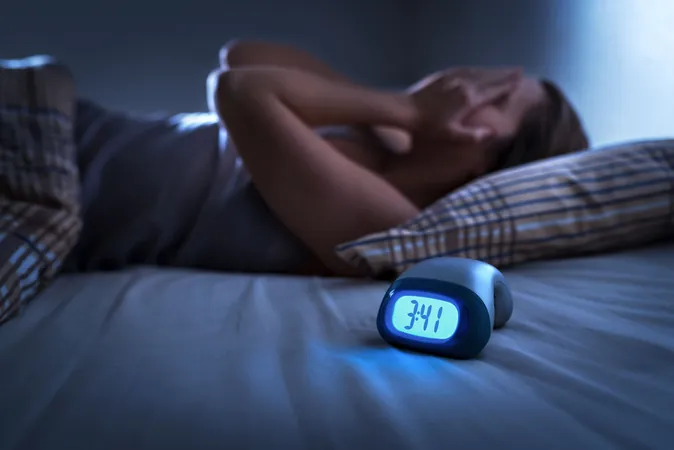
Surprising Link Between Undiagnosed Asthma and Insomnia Revealed by New Study
2024-11-10
Author: Arjun
Introduction
A groundbreaking study has uncovered a significant connection between undiagnosed asthma and increased symptoms of insomnia, shedding light on an often-overlooked aspect of respiratory health. Published in the Journal of Sleep Research, this community-based investigation challenges previous research, which has mainly been confined to clinical environments.
Study Overview
The researchers stated, "There is a lack of consensus on the association between symptoms of sleep disorders and objective measures of lung function." While some studies indicate that reduced lung function correlates with greater sleep disturbances, others suggest the opposite. This ongoing debate has left many questions unanswered.
Findings
In this new study, 2,093 adults with respiratory symptoms were surveyed using the Global Sleep Assessment Questionnaire (GSAQ), which assesses insomnia and various sleep disorders. The findings were telling: 9.13% of participants met the criteria for undiagnosed asthma, and these individuals reported insomnia symptoms with a significant odds ratio of 2.58 compared to those without the condition.
Previous Research
The research aligns with previous studies that have documented a high prevalence of insomnia in asthma patients, particularly among those with poorly controlled asthma. It appears that the burden of asthma symptoms, especially nocturnal ones, combined with immune system responses that trigger shared inflammatory pathways, may explain this troubling association. Fascinatingly, genetic epidemiological studies have indicated a one-way risk factor, where genetically predisposed insomnia patients are more likely to develop asthma.
Chronic Insomnia and Asthma Development
One study, known as the HUNT study, revealed that individuals suffering from chronic insomnia were three times more likely to develop asthma than their well-rested counterparts. Similarly, a recent investigation showed that patients with asthma who also experienced insomnia had nearly twice the average rate of exacerbations compared to those who slept soundly.
Chronic Obstructive Pulmonary Disease (COPD)
In the current study, another 9.79% of participants showed signs of undiagnosed chronic obstructive pulmonary disease (COPD). While there was a noted initial association between undiagnosed COPD and insomnia symptoms, this link faded when other factors were accounted for.
Additional Sleep-Related Issues
The researchers highlighted additional sleep-related issues reported by participants, including daytime sleepiness, snoring, and restless leg syndrome, but found no substantial association with COPD or asthma—countering some earlier findings. They speculate that this may be due to the limited number of patients with severe conditions in their sample, potentially skewing the results.
Implications of Diagnosis
Interestingly, of those with verified diagnoses of asthma or COPD, there was no observable link to insomnia or other sleep disorders. This suggests that the absence of formal diagnosis may play a critical role in the overall health outcomes of these patients.
Conclusion
Given these revelations, the researchers advocate for the screening of coexisting sleep disorder symptoms in patients presenting respiratory issues. This could enhance the management of both asthma and insomnia, ultimately leading patients to a better quality of life.
Call to Action
With sleep disorders and respiratory diseases on the rise, these insights prompt a necessary conversation about healthcare practices and the importance of holistic assessment in patient care. Don’t overlook the signs—are you or someone you know struggling with both asthma and insomnia? The connection may be closer than you think!




 Brasil (PT)
Brasil (PT)
 Canada (EN)
Canada (EN)
 Chile (ES)
Chile (ES)
 España (ES)
España (ES)
 France (FR)
France (FR)
 Hong Kong (EN)
Hong Kong (EN)
 Italia (IT)
Italia (IT)
 日本 (JA)
日本 (JA)
 Magyarország (HU)
Magyarország (HU)
 Norge (NO)
Norge (NO)
 Polska (PL)
Polska (PL)
 Schweiz (DE)
Schweiz (DE)
 Singapore (EN)
Singapore (EN)
 Sverige (SV)
Sverige (SV)
 Suomi (FI)
Suomi (FI)
 Türkiye (TR)
Türkiye (TR)